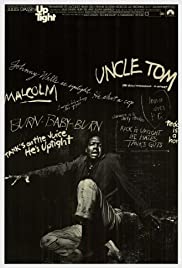
UPTIGHT
US, 1969, 104 minutes, Colour.
Julian Mayfield, Ruby Dee, Raymond St. Jacques, Roscoe Lee Browne, Frank Silvera.
Directed by Jules Dassin.
Uptight suggests tension, American tension, and the film is a tense look at the urban African American problems, black impatience and black power.
Director Jules Dassin had quite a range of interests and cinema successes including Rififi, He Who Must Die, Topkapi and Never on Sunday. He collaborated with actors Ruby Dee and Julian Mayfield in their adaptation from Liam O'Flaherty's novel of Irish tension, The Informer (filmed by John Ford in 1935 with Victor McLaglan). A similar thing was done with an adaptation of the Irish Odd Man Out to The Lost Man with Sidney Poitier in 1969.
The film opens with the funeral of Martin Luther King and a group of 'New Negroes' in Cleveland watching the regrettable passing of the old non-violence martyr but thinking ahead to the time when they are their own law and power. The story is one of betrayal and pursuit of the betrayer and is a good thriller, but the black problems come to the fore, especially city problems and changing phases of policy.
Not a masterpiece, the film has a kind of journalistic pace and intensity which means that we enjoy reading the message even though the message is a sombre one. In this way it is an effective film on race problems.
1. How were the film and its message affected by the setting of the story immediately after the death of Martin Luther King and making the killing incident part of the riots associated with this funeral?
2. What would the immediate impact of the King assassination setting be on a black audience and how would it dispose them for the film? What would be the impact of the assassination setting on a white audience and how would it dispose them for the film?
3. Is the Cleveland problem typical of other urban areas in the US?
4. The film was based on a story of the Irish Troubles. Is there any parallel here in the oppressors, the oppressed and the tactics for liberation? (Remember the parallel also between Odd Man Out and The Lost Man.)
5. The Cleveland power group was anti-Martin Luther King's attitudes - the non-violent attitudes had not succeeded; it is time for change, for violence and for action independent of all whites. Do the film as a whole and its makers subscribe to this theory?
6. Tank is the principal character. Why did he betray Johnny - note his sorrow at King's death, his fondness for drink, his age, his past record of action in the mills, idolised by Johnny and his friends, his lack of intelligence and weak will, his dependence on the favour of others. Again, he was rejected as old and outmoded by the power committee and Johnny's name used against him, yet he was prepared to be used by then. Note also the pressure on his love to provide money for the mother and her children.
7. Was Tank an effective deceiver? What did he learn about his actions from the way he used the reward money? Easy-going, liking to be liked, even generous?
8. How anti-white is Uptight? The power group don't want to be letting any whites help them no matter how willingly. Tank is treacherous also because he succumbs to the whites. The black who collaborated with the police is a homosexual and is presented unsympathetically.
9. Discuss the comment on black-white relationships in the carnival scene where Tank preaches a comic sermon on the black takeover and everyone is shown in distorted mirrors. The scene is cleverly funny but the meaning seems deadly earnest.
10. What basis of law, power and justice did the power group have for their trial, condemnation and execution of Tank? (Note the academic thinking in the power group. While the henchmen are still in jeans and jackets, the leaders are in neat, Black-Muslim? clothes and wear spectacles.)
11. The film begins and ends with, a chase and music; discuss the relative merits of the chase sketches and song about Johnny at the opening and then the purgatory-like wandering of Tank through his familiar world until he is swallowed up in it and in death - the previously plaintive humming and organ music of the Time is Tight theme works into an evocative climax.